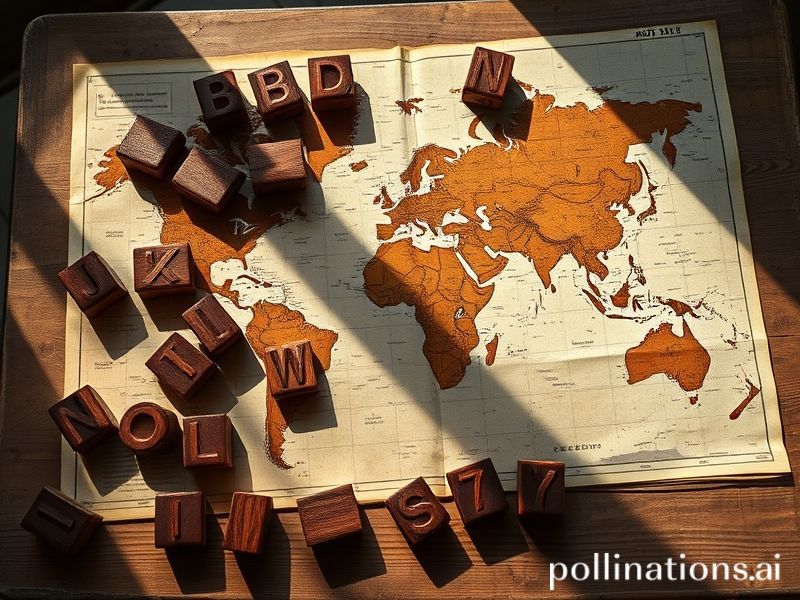From Phoenicia to Phishing: How 26 Letters Conquered, Corrupted, and Connected the Planet
The Alphabet: Twenty-Six Letters and a World of Trouble
by L. M. “Ludo” Mercier, Foreign Correspondent at Large
It began, as most mischief does, in the Levant. Some enterprising Phoenician merchants, bored of tallying amphorae with scratches on clay, condensed Egyptian hieroglyphs into a tidy set of squiggles that could be carved into cedar and shouted across ports from Tyre to Tarshish. A modest innovation, really—about as flashy as a new Excel macro—yet it would eventually let teenage trolls from Tulsa to Tashkent call your mother regrettable things in under a second.
Fast-forward three millennia and the alphabet remains humanity’s most democratic weapon. Thirty-three symbols if you’re Russian, twenty-eight if you’re Arab, twelve if you’re Hawaiian and already late for the luau. The Chinese, ever the overachievers, shrug and deploy 50,000 characters, but even they still need the Latin A-Z for email addresses—proof that no empire, Communist or capitalist, can escape @gmail.com.
Consider the global balance of alphabetic power. English, with its bloated 171,000-word Scrabble dictionary, dominates air-traffic control, pop music, and the Terms & Conditions none of us read. French clings to diplomacy like a perfume-soaked security blanket, while Arabic surges across 4G towers and minaret loudspeakers alike. Swahili borrows from Arabic, German pillages Latin, and Vietnamese—God bless its tonal soul—takes the Latin alphabet, adds so many diacritics it looks like a drunken game of pick-up sticks, and still manages to fit on a Vespa license plate.
The alphabet, in short, is the original open-source software. No patents, no paywalls, no mandatory update that bricks your tablet. Yet the moment you string letters into words, the lawyers pounce. Qatar copyrighted “QATAR,” Iceland protects “Iceland,” and the World Intellectual Property Organization in Geneva has entire filing cabinets devoted to fights over who owns “Borat.” Tyrants, meanwhile, jail poets for the order of the same 26 characters; dictators fear consonants more than cruise missiles because a single sentence—“The emperor has no clothes”—can travel faster than any hypersonic warhead.
Meanwhile, Silicon Valley has monetized the alphabet so thoroughly that the word itself is now a brand. Google’s parent company re-christened itself Alphabet Inc., presumably because “Greed, Envy, Lust, Sloth, and Data-Mining LLC” tested poorly with focus groups. The re-branding allowed investors to file the company under “A” in their portfolios and, more importantly, reminded the planet that while you were learning your ABCs, they were trademarking them.
Out in the real world, the alphabet remains the cheapest passport. A refugee with a borrowed pen can scratch “help” on cardboard and be understood from Lesbos to Laredo. Conversely, remove one letter from a tweet and you can start a border war: witness #Kiev vs #Kyiv, or the annual Twitter skirmish over “Macedonia.” The letters don’t even have to be legible; witness the global panic whenever North Korean state TV flashes a poster reading “미국” (miguk). Two syllables, millions of basement preppers ordering iodine tablets on Amazon.
And what of the future? Linguists tell us texting is pruning English into minimalist haikus; entire generations now regard punctuation as optional seasoning, like parsley on prison food. Emoji threatens to replace the alphabet entirely, reducing Shakespeare to aubergines and crying-laughing faces. Yet even these pictograms still need names, and those names—written, catalogued, argued over—are spelled out in… you guessed it, the alphabet.
So here we are, circling back to those Phoenician peddlers. They wanted a quicker way to bill clients for goat wine; they ended up wiring the species into one giant, squabbling, meme-addled neural net. The alphabet gave us the Magna Carta, Mein Kampf, “I Have a Dream,” and the comment section under baby-panda videos. It is simultaneously the greatest tool of collective wisdom and the loudest karaoke machine for fools.
Use it wisely, dear reader. Or at least spell-check before you declare war.







